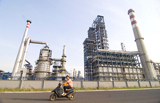China has outlined plans for revitalizing and restructuring its light industries and often loss-making oil refining sector, in the government’s latest effort to help create jobs and boost economic growth.
The plans, issued by the State Council late on Monday and posted on the government’s Web site, are aimed at creating about 3 million jobs and helping manufacturers weather a sharp downturn in export demand amid the global financial crisis.
The measures are typical of the Chinese Communist Party’s penchant for grand, multiyear economic plans.

PHOTO: EPA
However, the government gave no specific dollar amount for the programs and it was unclear whether or not some costs are included in a 4 trillion yuan (US$586 billion) economic stimulus package announced late last year, which focused on construction projects.
The outline for the refining sector calls for raising crude oil processing capacity by about 18 percent from last year to 405 million tonnes a year by 2011.
By then, China plans to build three or four major refineries in the Yangtze River Delta, near Shanghai, and the Pearl River Delta, near Hong Kong in southern China, the notice by the State Council said.
Each plant would be able to process 20 million tonnes of crude oil per year, it said.
Meanwhile, existing refineries will be upgraded to become less polluting, with energy efficiency to be improved and discharges of waste water and sulfur dioxide to fall by more than 6 percent.
Chinese refineries processed more than 342 million tonnes of crude oil last year, while much of the country faced chronic shortages of diesel and gasoline, particularly before growth slowed late in the year.
Soaring crude oil prices left major refiners with massive losses because of price controls that prevented oil companies from passing on higher costs for oil imports to end users.
The government’s plans for the light industrial sector, also issued on its Web site, also did not include any financial details.
They call for upgrading technology and providing more support for small and medium-sized businesses that dominate the sector but suffer from a lack of access to back loans and other financing.
Light industries such as home appliance, apparel, shoe, furniture and plastics products makers employ some 35 million people and once dominated China’s export sector.
But thousands of such factories have closed amid the global downturn and many of those remaining need upgrading and improved environmental protection.
“At the same time that our light industry has grown very quickly, some long-term, acute contradictions and problems have emerged,” the plan said.

MORE VISITORS: The Tourism Administration said that it is seeing positive prospects in its efforts to expand the tourism market in North America and Europe Taiwan has been ranked as the cheapest place in the world to travel to this year, based on a list recommended by NerdWallet. The San Francisco-based personal finance company said that Taiwan topped the list of 16 nations it chose for budget travelers because US tourists do not need visas and travelers can easily have a good meal for less than US$10. A bus ride in Taipei costs just under US$0.50, while subway rides start at US$0.60, the firm said, adding that public transportation in Taiwan is easy to navigate. The firm also called Taiwan a “food lover’s paradise,” citing inexpensive breakfast stalls

TRADE: A mandatory declaration of origin for manufactured goods bound for the US is to take effect on May 7 to block China from exploiting Taiwan’s trade channels All products manufactured in Taiwan and exported to the US must include a signed declaration of origin starting on May 7, the Bureau of Foreign Trade announced yesterday. US President Donald Trump on April 2 imposed a 32 percent tariff on imports from Taiwan, but one week later announced a 90-day pause on its implementation. However, a universal 10 percent tariff was immediately applied to most imports from around the world. On April 12, the Trump administration further exempted computers, smartphones and semiconductors from the new tariffs. In response, President William Lai’s (賴清德) administration has introduced a series of countermeasures to support affected

CROSS-STRAIT: The vast majority of Taiwanese support maintaining the ‘status quo,’ while concern is rising about Beijing’s influence operations More than eight out of 10 Taiwanese reject Beijing’s “one country, two systems” framework for cross-strait relations, according to a survey released by the Mainland Affairs Council (MAC) on Thursday. The MAC’s latest quarterly survey found that 84.4 percent of respondents opposed Beijing’s “one country, two systems” formula for handling cross-strait relations — a figure consistent with past polling. Over the past three years, opposition to the framework has remained high, ranging from a low of 83.6 percent in April 2023 to a peak of 89.6 percent in April last year. In the most recent poll, 82.5 percent also rejected China’s

PLUGGING HOLES: The amendments would bring the legislation in line with systems found in other countries such as Japan and the US, Legislator Chen Kuan-ting said Democratic Progressive Party (DPP) Legislator Chen Kuan-ting (陳冠廷) has proposed amending national security legislation amid a spate of espionage cases. Potential gaps in security vetting procedures for personnel with access to sensitive information prompted him to propose the amendments, which would introduce changes to Article 14 of the Classified National Security Information Protection Act (國家機密保護法), Chen said yesterday. The proposal, which aims to enhance interagency vetting procedures and reduce the risk of classified information leaks, would establish a comprehensive security clearance system in Taiwan, he said. The amendment would require character and loyalty checks for civil servants and intelligence personnel prior to